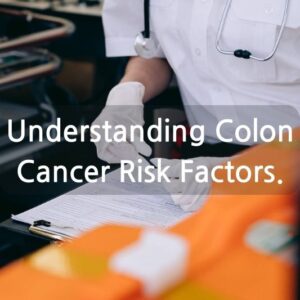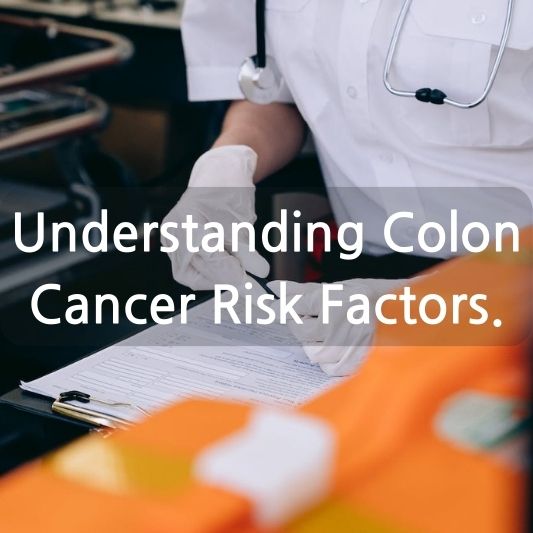Colon cancer, also known as colorectal cancer, is a serious health condition affecting thousands of individuals worldwide. Understanding the risk factors associated with colon cancer is crucial for prevention and early detection. In this article, we delve into the various factors that contribute to the development of colon cancer.

Genetic Factors and Colon Cancer Risk
Family History
A significant risk factor for colon cancer is a family history of the disease. Individuals with first-degree relatives diagnosed with colon cancer are at higher risk themselves. The risk increases if multiple family members are affected or if the diagnosis occurred at a younger age.
Genetic Syndromes
Certain genetic syndromes predispose individuals to colon cancer. Conditions like Lynch syndrome and familial adenomatous polyposis (FAP) significantly increase the likelihood of developing colorectal cancer at an early age. Genetic testing and counseling are essential for individuals with a family history of these syndromes.
Lifestyle Factors and Colon Cancer Risk
Diet and Nutrition
A diet high in processed meats, red meats, and low in fiber-rich foods like fruits, vegetables, and whole grains is associated with an increased risk of colon cancer. Consuming a balanced diet rich in fiber and nutrients can help reduce this risk.
Physical Activity
Sedentary lifestyles contribute to higher colon cancer risk. Regular physical activity not only helps maintain a healthy weight but also reduces inflammation and improves digestion, lowering the risk of colorectal cancer.
Obesity
Obesity and excess body fat, particularly around the abdomen, are linked to an increased risk of colon cancer. Maintaining a healthy weight through diet and exercise is essential for reducing this risk.
Smoking and Alcohol Consumption
Tobacco use and excessive alcohol consumption are known risk factors for various cancers, including colon cancer. Quitting smoking and moderating alcohol intake can significantly decrease the risk of developing colorectal cancer.
Medical Conditions and Colon Cancer Risk
Inflammatory Bowel Disease (IBD)
Chronic inflammatory conditions of the colon, such as ulcerative colitis and Crohn’s disease, increase the risk of colon cancer over time. Regular monitoring and management of these conditions are essential for early detection and prevention of colorectal cancer.
Diabetes
Individuals with diabetes, particularly type 2 diabetes, have a higher risk of developing colon cancer. Proper management of blood sugar levels and lifestyle modifications can help mitigate this risk.
Radiation Therapy
Previous radiation therapy to the abdomen or pelvis, often used to treat other cancers, may increase the risk of developing colon cancer later in life. Patients who have undergone radiation therapy should undergo regular screenings for colon cancer.
Screening and Prevention
Regular screening for colon cancer is crucial for early detection and improved outcomes. Colonoscopy, fecal occult blood tests, and stool DNA tests are among the screening methods available. Lifestyle modifications such as adopting a healthy diet, maintaining a healthy weight, regular exercise, and avoiding tobacco and excessive alcohol use can significantly reduce the risk of colon cancer.
Conclusion
Understanding the risk factors associated with colon cancer is paramount for prevention and early detection. By addressing modifiable risk factors such as diet, physical activity, and lifestyle choices, individuals can significantly reduce their risk of developing colorectal cancer. Moreover, regular screenings can aid in the early detection of precancerous polyps or early-stage cancer, leading to better treatment outcomes and improved survival rates.
FAQs
Is colon cancer preventable?
While not all cases of colon cancer are preventable, adopting a healthy lifestyle and undergoing regular screenings can significantly reduce the risk.
At what age should I start getting screened for colon cancer?
Screening guidelines recommend starting regular screenings at age 45 for average-risk individuals.
Are there any natural ways to reduce colon cancer risk?
Yes, maintaining a healthy weight, eating a balanced diet high in fiber, fruits, and vegetables, and engaging in regular physical activity can help reduce the risk.
Can colon cancer be hereditary?
Yes, certain genetic syndromes and family history can increase the risk of colon cancer.
How often should I get screened for colon cancer?
The frequency of screenings depends on individual risk factors and the screening method used. Consult with your healthcare provider for personalized recommendations.
Learn more about colon Cancer!
